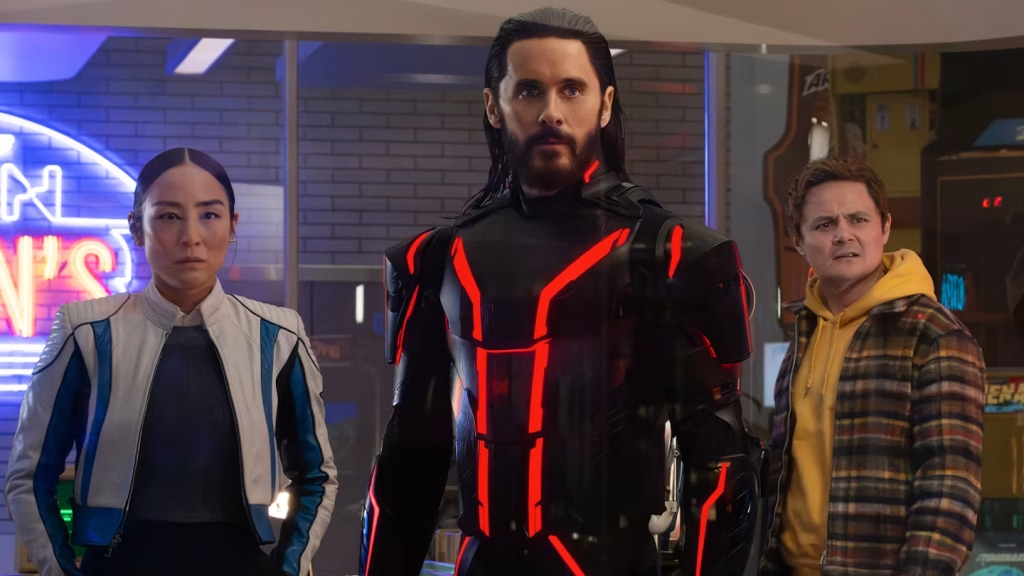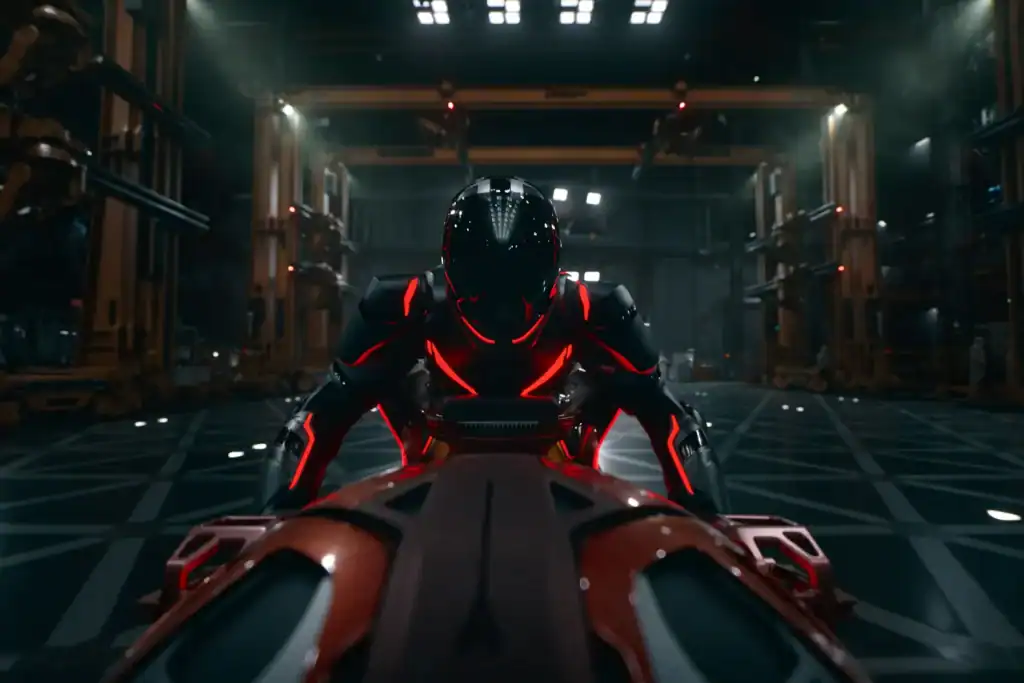As a franchise, Tron has been one of the more interesting IPs. Steven Lisberger kicked things off in 1982 with the first film, which was revolutionary in terms of its visual scope, as it took moviegoers into a fascinating digital world. Reviews from critics were mixed, and the movie was only a moderate success at the box office; however, it eventually built a strong cult following among viewers who found its groundbreaking visuals and potential universe-building to be a solid form of escapism. The cult following was enough to create a multimedia franchise and launch a sequel years later when Tron: Legacy, directed by Joseph Kosinski, was released in 2010. Again, the sequel also received mixed reviews, but with a global gross of $409.9 million on a $170 million budget, along with an expansion of its cult status, word of a follow-up began to emerge once again. Fans had to wait years again for the arrival of Tron: Ares, the latest installment of the franchise, which, in many ways, stays perfectly in line with what came before it. As of this writing, critical reviews are mixed, but fans of jumping back into The Grid will be perfectly satisfied with what Tron: Ares has to offer. The movie doesn’t offer up a groundbreaking story (much of it feels heavily inspired by the early Terminator films), but it’s a gorgeous visual spectacle backed by a thumping original score from Nine Inch Nails that keeps the third installment brimming with kinetic energy. Needless to say, fans of the franchise are likely to be pleased.
As we enter Tron: Ares, The Grid is colliding with the physical world as the film looks into what happens when the digital world has to encounter the regularity of planet Earth. The franchise has been toying with this concept since the beginning, and it’s more realized here, set several years after the events of the second film. The audience is introduced to Ares (Jared Leto), an AI program while highly sophisticated, is plagued by the limitations of its creations, which only allows it to maintain its physical state before desemulation after 29 minutes causes it to destroy itself and simply create another. Ares is the brainchild of Julian Dillinger (Evan Peters), the current CEO of Dillinger Systems and the grandson of Ed Dillinger (portrayed by David Warner in the 1982 film). Ed Dillinger was once the vice president of ENCOM and a coworker of Kevin Flynn (Jeff Bridges), before he used the Master Control Program to steal his work for his own nefarious needs.
Julian has followed in his grandfather’s footsteps in many ways, using the Master Control Program to give out orders to Ares, Athena (Jodie Turner-Smith), and other programs to carry out his various goals, none more important than coming out ahead of his competition, ENCOM, being run by current CEO Eve Kim (Greta Lee). Eve is a sort of reluctant leader, someone who was thrust into the CEO position when her sister passed away from cancer before her signature work could be completed. Eve’s sister was in search of Kevin Flynn’s Permanence Code, something Julian needs to avoid the desemulation of his programs. Eve wants to use the technology to improve mankind, while Julian desires to use it to make his programs more reliable weapons. In the midst of this, like most AI, Ares is learning, and he is gradually becoming uninterested in being used by Master Control and wants to know what it’s like to exist in reality.

Director Joachim Rønning, along with cinematographer Jeff Cronenweth and a more than capable visual effects team, has created a visual world so immersive that it quite literally feels as if it’s pulling you into The Grid itself. This is an expansion of what was created in Tron and Tron: Legacy, and it’s a natural evolution that is a wonder to behold. Tron: Legacy felt like a dreamlike visual landscape, while Ares places its action and visuals in a more physical realm. The effects courtesy of Industrial Light & Magic are some of the best you’ll see this year (at least until Avatar: Fire & Ash arrives in December), and they succeed because Rønning gives them substantial weight that blurs the line between visual effects and physicality. The light cycles, laser trails, and disc battles, while crafted heavily with visual effects, have a tangible weight that allows them to form a sort of perfect marriage with that of the real world. What surprised and amazed me the most was the decision to frequently marry practical elements into a digital landscape that felt effortless and seamless. The Grid truly collides with the real world in a way that looks so visually realistic that the entire team deserves a round of applause for establishing a world where this seems possible.
The visuals offer up some fun throwbacks, none more fun than when Ares is sent into Kevin Flynn’s software world, which harkens back to the ’80s look of the original film. This is merely done to give Bridges an extended cameo (he has appeared in all three films so far), but it’s still nothing short of extraordinary. Looking at an evolved version of where the franchise began, mixed with the current visuals of today, shows just how far effects have come since 1982.
Working perfectly in sync with the visuals is the pulse-pounding score courtesy of Nine Inch Nails. One of the big reasons Tron: Legacy has maintained a big cult following is the memorable score provided by Daft Punk, which was an expansion of the electronic score pioneered by Wendy Carlos for the 1982 film. Daft Punk certainly set a high bar, but Nine Inch Nails does backflips over it to create the franchise’s best score to date. Trent Reznor and Atticus Ross are 2x Academy Award-winning composers and have crafted their fair share of film scores on their own, but not under their band moniker until now. The result is a score that adds an electrifying propulsion to almost every scene as they utilize a gritty industrial club-influenced sound that helps drive the narrative forward. The music is essentially a character itself, and it never once feels like background noise. It’ll be interesting if The Academy chooses to acknowledge the music because, while not a traditional score, it does what any good score should do, and that’s enhance the emotion and narrative of every scene.

Leto is the de facto lead here because it’s the knowledge gained by Ares that helps drive the story, but moviegoers may feel more connected to Lee’s Eve Kim. She’s more of a mirror for the audience, and Lee’s earnest and capable performance is one of the film’s best. That’s not to say that Leto is bad at all. The nature of his character keeps him at an arm’s length for a bit because he’s a program lacking human emotion, but as the film goes along, the actor taps into some interesting character beats. He admirably portrays the digital warrior with ease, but it was refreshing seeing him showcase a sense of humor that is lacking from most of his performances as he begins to become more self-aware. Depeche Mode gets a fun shoutout courtesy of Ares that most fans of their ’80s synth sound will agree with, while he also begins to establish a solid chemistry with Lee, completely grounded in friendship as they both learn to trust each other. Leto, who also serves as a producer on the project, is a self-described devotee of the franchise, and it shows. He clearly is handling film with as much care as possible, and that shines through in his performance.
The supporting cast is also top-notch, with Turner-Smith doing her best T-1000 as Athena, commanding the screen whenever she graces it. As Julian, Peters embodies entitlement, portraying someone over their head and blind with power effectively. He’s nowhere near likable, but Peters allows SOME humanity to shine through, especially later in the film involving a scene with his mother Elisabeth (Gillian Anderson), who can tell her son doesn’t share the true vision of what the company represents. Julian is the classic case of insecurity corrupting a brilliant mind, and Peters hits all the right notes in that regard. Should the film get a follow-up, the movie presents a possibility with his character that is pretty intriguing.
If there are any faults to be had, it’s with the story itself. There is nothing especially groundbreaking about the film’s themes of AI being used as weapons if placed in the wrong hands or AI becoming self-aware enough to go rogue and begin making decisions on its own. The film’s screenplay, courtesy of Jesse Wigutow from a story he concocted with David DiGilio, is occasionally bogged down with too much exposition as the characters’ dialogue is used to help the audience understand some of the film’s more technical jargon, which isn’t all that complex. It’s a shame that the film’s story wasn’t as innovative as its visuals and score, but this has been the nature of the franchise since the beginning, and it doesn’t improve much here. Not a total detriment, but it’s noticeable when compared to the film’s technical aspects.
Story elements that are lacking aren’t enough to prevent this neon-dream from being highly entertaining. Tron: Ares delivers where it counts as a visual wonder, aided by a score that tears the walls down to take the audience into a digital world that’s worth visiting. As science fiction, Tron: Ares may not break the mold, but it’s an action-packed visual wonder that will make fans of The Grid very happy with this third installment.
Tron: Ares opens nationwide this Friday.
Tron: Ares delivers where it counts as a visual wonder, aided by a score that tears the walls down to take the audience into a digital world that's worth visiting. As science fiction, Tron: Ares may not break the mold, but it's an action-packed visual wonder that will make fans of The Grid very happy with this third installment.
-
GVN Rating 7.5
-
User Ratings (1 Votes)
9.4

Hello! My name is Gaius Bolling: movie, TV, and pop culture junkie! The industry has been in my veins since I was a kid and I have carried that on through adulthood. I attended Los Angeles Film Academy and participated in their screenwriting and editing program. From there, I have learned to hone my skills in the world of entertainment journalism. Some of my favorite genres include horror, action, and drama and I hope to share my love of all of this with you.






